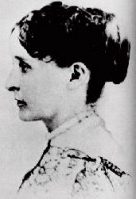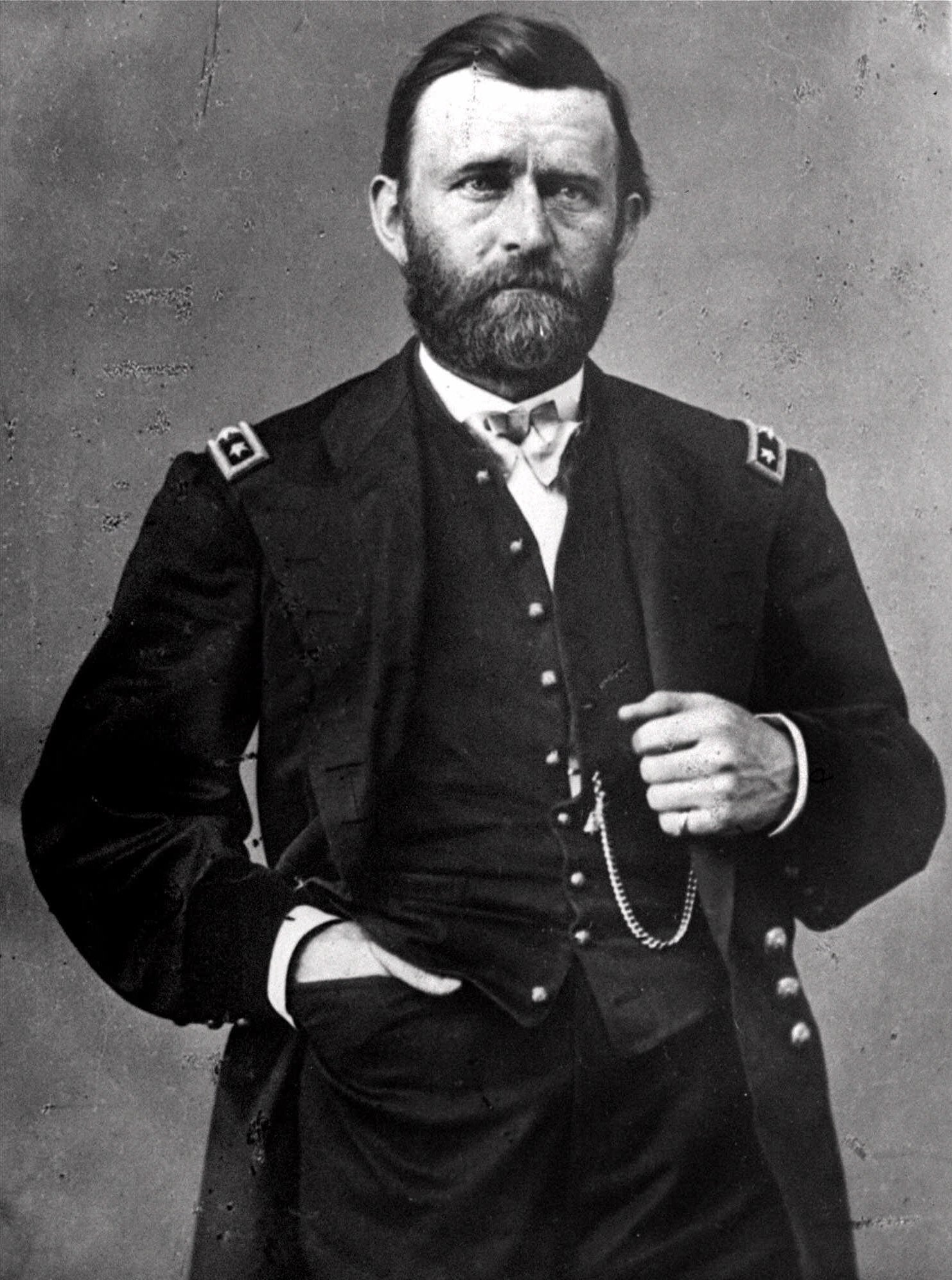A Mother At Petersburg

The Confederate lines around Petersburg, Virginia, broke in the first days of April 1865. As Lee’s army headed west into the Appomattox Campaign, Union troops occupied the small city that had been the heart and namesake of a nine month siege.
Trapped in a civilian home inside Petersburg, Mrs. John B. Gordon couldn’t escape with her husband and his Georgia soldiers. Not much had stopped her during this war. She had been admired for her courage and complained at for her tenacity. She had nursed her wounded general back to health, had survived near capture in the Shenandoah Valley, and had tried to rally troops while artillery shells crashed near her in a Winchester street. But this time – in the final days of the war – she wouldn’t be able to keep up with the army. Her baby was due any day; she would have to stay in Petersburg and hope for kindness from the Union soldiers.
When the Civil War began in 1861, Frances Rebecca (Fanny) Gordon had been married for five years and had two little boys toddling around the house. Her husband – John B. Gordon – decided to volunteer, and Fanny chose to come along. She would not fight; she would not be a female soldier. No, Mrs. Gordon was always a “lady,” but she would build her own reputation as the general’s wife in the coming years.

From captain to general, John Gordon climbed the chain of command. Badly wounded during the Battle of Antietam (1862), he recuperated and credited Fanny with saving his arm and keeping him alive with her newly-acquired nursing skills. During the 1864 Shenandoah Valley Campaign, Confederate General Early complained on several occasions about Mrs. Gordon and her carriage, trailing the army. However, when Mrs. Gordon teasingly confronted the commanding officer about his words, Early paid her a compliment, saying, “General Gordon is a better soldier when you are close by than when you are away, and so hereafter, when I issue orders that officer’s wives must go to the rear, you may know that you are excepted.”[i] High praise from a commander who notoriously fussed about women near the army!
Fanny Gordon followed her general and his troops to Petersburg and remained for the duration of the siege. At some point, she rented or accepted a hospitable invitation to stay in a room at a civilian home in the town. Prior to General Gordon’s attack on Fort Steadman at the end of March 1865, “…Mrs. Gordon sat in her room in Petersburg, tearing strips of white cloth to tie across the breast of the leading detachments, that they might recognize each other in the darkness and in the hand-to-hand battle expected at the Federal breastworks and inside the fort.”[ii]
The general’s memoir and other documents are mostly silent about the expected baby. This isn’t uncommon in primary sources from this era; frequently, a baby suddenly appears in a source after an euphemistic “illness” or “time of indisposition.” However, from a twenty-first century perspective, it’s not improper to surmise that Mrs. Gordon probably knew she was expecting her third child at some point a little before or during the autumn 1864 Valley Campaign. Aside from doing helpful little tasks for the soldiers, she probably spent her days during the Petersburg siege waiting, praying, and surviving the physical changes, aches, challenges of pregnancy.

When the siege lines broke and the Confederate army tried to escape, General Gordon left his wife in the “city of gloom.” Riding west, he recalled feeling worried and depressed – not just about the coming Confederate end – but “another burden– personal woe–was weighing upon me.” He went on to reveal his concern for his wife, saying with classic 19th Century delicacy, “She was sick.”[iii] General Gordon had reason to be concerned about the situation. Childbirth complications and infection stole the lives of many mothers.
And – what would the Yankees do? On that point, the gentleman general had some confidence, “I found comfort in the hope that some chivalric soldier of the Union army would learn of her presence and guard her home against all intruders.”[iv] Union General Grant issued orders to his men that civilians in Petersburg staying quietly in their own homes would be left alone. The blue-coated men and officers took over the city.
We don’t know what Mrs. Gordon thought when she heard the news or noticed the noise of the occupying Yankee army. We do know that at some point after the Confederate departure and before the Union troops had been there a long time she gave birth to a son: John B. Gordon, Jr.

Good news travels fast, even in an enemy army. And what better local news than the safe arrival of new baby? Apparently, Grant heard about Mrs. Gordon’s situation, and, recognizing the last name, he sent her a message and a detail of sentries to guard the home where she was staying to prevent any disturbance.
Mrs. Gordon’s sentries allowed her to receive telegraph messages. Just three days after General Lee surrendered and on the very day General Gordon had led the Confederate army in the laying down arms ceremony, she received a brief note. “I am well and will be in Petersburg in a few days,” the general wrote. The following day, he sent another wired message as he journeyed back toward Petersburg: “Let me know by telegraph how you are. I will be down tomorrow.”[v]
When the war-weary general arrived at his wife’s temporary home, he didn’t get the reception he expected. Armed sentries barred the door, and the officer in charge of the detail announced, “We are here by General Grant’s orders to protect General Gordon’s wife from intrusion at this time. You cannot pass.”[vi] Perhaps stunned, perhaps pleased at their diligence, the general answered, “Well, I’m just Mrs. Gordon’s husband…”[vii]
Once inside, General Gordon found his wife and new baby doing well. They waited a while longer, then set off with another officer and family to return to Georgia.
Unfortunately, details of Fanny Gordon’s motherhood experience during the siege and capture of Petersburg are limited or non-existent. That’s understandable for that era and the medical modesty that veiled pregnancy and childbirth. So we don’t have much to fill in the story.

We do know that Mrs. Gordon chose to enter the besieged town and stay near her husband rather than returning to her family and other children in Georgia. (Possibly a safer decision in 1864?) As her baby grew, developed, and kicked inside her womb, she lived within sound and sometimes sight of the ongoing siege. What feelings and emotions would that little life have prompted in this mother at that time?
The time for the baby’s arrival and the end of the siege slid together, forcing her to stay behind and be captured. We can only wonder what sort of discussion – verbal or written – must have passed between the couple as the siege conclusion came closer. In the end, she stayed in Petersburg and brought her baby son into the world. This baby altered the ending of the war for the Gordon family.
Motherhood kept Fanny Gordon out of the Appomattox Campaign and away from the surrender scenes. Caught between armies and protected by former enemies, Fanny Gordon cradled her son, waiting for her general to come back.
Sources:
[i] Eileen F. Conklin, Women at Gettysburg, 1863, Revisited (2013), Page 31.
[ii] Ibid, Page 33.
[iii] J.B. Gordon, Reminiscences of the Civil War, (1904), Page 423.
[iv] Ibid, page 423.
[v] Eileen F. Conklin, Women at Gettysburg, 1863, Revisited (2013), Page 34.
[vi] Ibid, Page 34.
[vii] Ibid, Page 34.
Ms. Bierle:
It remains to be said only that at Antietam, Gordon received five wounds, but was saved by the love and devotion of this very energetic and gutsy woman, who managed to get a little liquid nourishment through his teeth, after his jaw was wired shut, and who cured an infection on his arm with repeated applications of iodine. This extraordinary woman lived almost into our own time, dying in 1931 at the age of 93, an almost unheard of longevity in those days. She soldiered on for another 27 years after her husband died in 1904, but her life was a pale copy of the life she had known with the knight who was known as John Brown Gordon. Here’s more:
http://clevelandcivilwarroundtable.com/articles/biography/john_fanny.htm
Indeed. It was very hard not to include every recorded courageous moment of Mrs. Gordon’s war experience. Perhaps I’ll write another article or two in the future about the Gordons after Antietam or in Winchester.
Wonderful piece about a forgotten but extraordinary woman.
– Michael Aubrecht
I don’t think I had heard this story before. Very interesting.